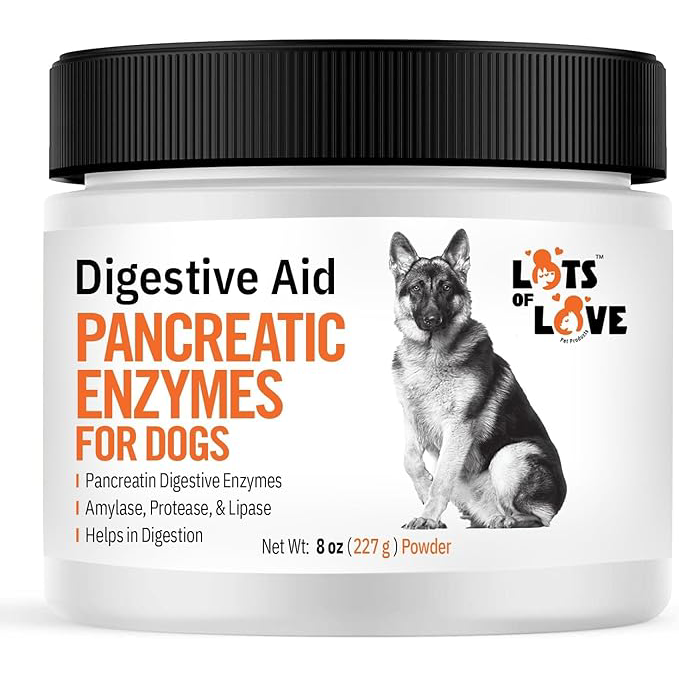The Functions of the Pancreas
An animal’s pancreas has two functions within the body—exocrine and endocrine functions. The endocrine pancreas secretes hormones and insulin, while the exocrine pancreas contains acinar cells that secrete zymogens and digestive enzymes, which are crucial for proper digestion.
Digestive enzymes are responsible for breaking down food so that the body can use those nutrients. In addition to helping produce digestive enzymes, the exocrine pancreas produces essential substances that help with absorption and other important digestive system functions, such as neutralizing gastric acid.
Exocrine Pancreatic Insufficiency - What Is EPI in Dogs & Cats?
Exocrine pancreatic insufficiency (EPI) is a disease characterized by the inadequate production of digestive enzymes from pancreatic acinar cells. Without an adequate amount of enzymes, the body can’t digest or absorb food. This leads to maldigestion and the malabsorption of nutrients.
In addition, EPI can lead to bacterial overgrowth in the intestines. Undigested food and unabsorbed nutrients end up feeding the bacteria living in the intestines, which leads to an overpopulation of bacteria and nutrient deficiencies. This often results in a vitamin B12 (also known as cobalamin) deficiency. If left untreated, EPI will deprive the body of the nutrients needed to survive.
What Causes Pancreatic Insufficiency?
The most common cause of EPI in dogs and cats is pancreatic acinar atrophy, which is a disease that destroys the acinar cells in the pancreas. Other causes include chronic pancreatitis, pancreatic neoplasia, and pancreatic hypoplasia.
Which Breeds Are Predisposed to EPI?
Some breeds have a higher risk of developing EPI. Many studies have shown that this disorder occurs more frequently in German Shepherd Dogs (GSD) than in other breeds. GSD are known to be predisposed to pancreatic acinar atrophy, the most common cause of EPI.
Another breed that is predisposed to EPI is German Shepherds and 20% are Rough Collies. About 70% of dogs with exocrine pancreatic insufficiency are German Shepherd Dogs and 20% are Rough Collies (Wendy Brooks, DVM, DABVP). The disorder is inherited in an autosomal recessive manner and is assumed to be an autoimmune disease in both GSD and Rough Collies.
Exocrine Pancreatic Insufficiency Symptoms
Diagnosing EPI in cats and dogs can be difficult because visible symptoms may not appear for months or even years. The most common clinical signs of EPI include:
- Diarrhea
- Increased fecal volume
- Polyphagia (excessive hunger and an abnormally large intake of food)
- Weight loss
- Dry coat and dandruff due to the inability to absorb dietary fats
- Stool eating due to malnutrition
- Anemia (from vitamin B12 deficiency)
EPI Treatment
EPI in dogs and cats can usually be successfully treated and regulated with pancreatic enzyme supplements. Enzyme supplementation will be needed for the rest of the pet’s life. Freeze-dried, powdered porcine enzymes are common and usually successful, rather than plant enzymes.
Because vitamin B12/cobalamin deficiencies are common with EPI, it’s important to consult with your veterinarian if you think your pet has a vitamin B12 deficiency. Symptoms of vitamin B12 deficiency include weakness, lack of energy, lack of appetite, diarrhea, and weight loss.
If your pet has a vitamin B12/cobalamin deficiency, your veterinarian may prescribe antibiotics for the bacterial overgrowth in the intestines. Many pets will also need vitamin B12 supplementation. In the past, giving vitamin B12 supplementation through injection was recommended, but studies have shown that pets have good results from oral vitamin B12 supplements.
According to Texas A&M University, recent studies in humans, dogs, and cats suggest that oral cobalamin supplementation is as equally effective as parenteral supplementation.
Pancreatic Digestive Enzymes for Dog & Cats by Lots of Love Pet Products
If your pet requires pancreatic enzyme supplementation, consider Pancreatic Digestive Enzymes for Dog & Cats by Lots of Love Pet Products! It is a high-potency, pancreatic enzyme powder designed to support the breakdown of carbohydrates, proteins, and fats. This digestive enzyme supplement assists in nutrient absorption, which is essential for proper digestion.
- The addition of vitamin B12 is important for pets that have a vitamin B12/cobalamin deficiency, which is a common secondary condition of EPI.
- Digestive enzymes are crucial for proper digestion. They are responsible for breaking down food so that the body can use those nutrients. They also support the immune system, improve the skin & coat, and provide energy. Pancreatic Enzymes for Dogs contains digestive enzymes that your pet needs to thrive.
Although exocrine pancreatic insufficiencies may seem overwhelming, most pets do well with enzyme supplementation. Finding a high-quality supplement that works for your pet is key!
Buy this product today from our Amazon Store.

 DOG HEALTH SUPPLEMENTS
DOG HEALTH SUPPLEMENTS DOG DIGESTIVE SUPPLEMENTS
DOG DIGESTIVE SUPPLEMENTS EYE & EAR DROPS
EYE & EAR DROPS SKIN & COAT SUPPLEMENTS
SKIN & COAT SUPPLEMENTS CAT SUPPLEMENTS
CAT SUPPLEMENTS


